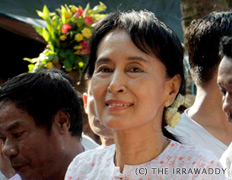
News about Daw Aung San Suu Kyi
Since her release on 13 November 2010, Daw Aung San Suu Kyi has proven that she continues to be a powerful force for social and political progress in Burma.
Follow her efforts to promote human rights, social development, democracy and national reconciliation in Burma in the following articles about her work, her words, and her long-awaited release.
Posts about ‘Daw Aung San Suu Kyi’
Navigating Paths to Justice in Myanmar’s Transition
Since President Thein Sein and his government took office in 2011, Myanmar’s transition has unfolded at a pace that has surprised many and earned the acclaim of western governments, financial institutions, and private-sector investment analysts.1 The Burmese population of approximately 60 million has endured more than a half-century of military dictatorship, armed conflict, economic dysfunction, and political repression.2 A meaningful transformation into a peaceful society that enjoys economic development and functions democratically now seems plausible, though it is far from guaranteed. Ultimately, the blanket immunity afforded by the 2008 Constitution shields the acts attributable to prior regimes from any form of accountability.3 Whether the reform process will evolve to include measures that address the massive and systematic injustices of the past remains less certain.
| |Police Investigations and Prosecutions Used to Harass News Media
Until recently, the media freedom situation in Burma was very promising but this is no longer the case. Reporters Without Borders is alarmed by the interrogation of many newspaper editors since 20 June and by the president’s recent expressions of hostility to freedom of information. In a threatening comment on 7 July, President Thein Sein said: “If there is any media that exploits media freedom and causes harm to national security rather than reporting for the sake of the country, effective legal action will be taken against that media.” […]
| |Burma: Journalists Given 10 years’ Hard Labour for Article on Chemical Weapons Factory
The sentencing of five media workers in Myanmar each to 10 years’ imprisonment with hard labour for “disclosing state secrets” makes today a dark day for freedom of expression in the country, Amnesty International said.
A court in the town of Pakokku today handed down the sentences to four reporters and the CEO of the Unity newspaper – Lu Maw Naing, Yarzar Oo, Paing Thet Kyaw, Sithu Soe and Tint San […]
| |State of the Word’s Minorities and Indigenous Peoples 2014
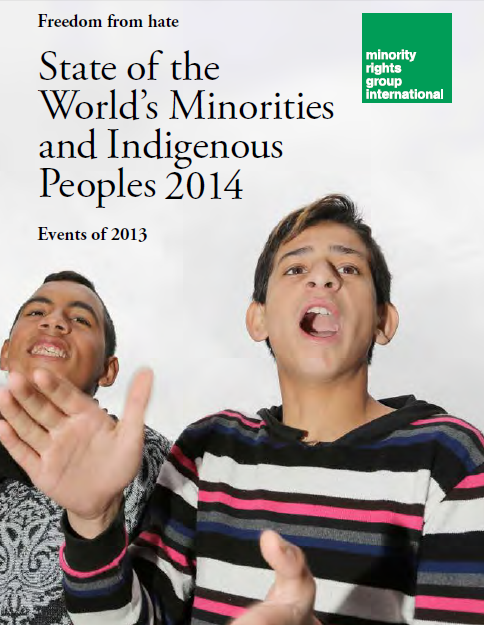 Hate crime towards minorities and indigenous peoples is a daily reality across Asia but is often ignored by the governments of the region, Minority Rights Group International (MRG) warns in its annual report. This year’s flagship report, State of the World’s Minorities and Indigenous Peoples 2014, is themed around ‘Freedom from Hate’ and shows that a worrying trend of vilification and hostility towards minorities and indigenous peoples has spread across the region.
Hate crime towards minorities and indigenous peoples is a daily reality across Asia but is often ignored by the governments of the region, Minority Rights Group International (MRG) warns in its annual report. This year’s flagship report, State of the World’s Minorities and Indigenous Peoples 2014, is themed around ‘Freedom from Hate’ and shows that a worrying trend of vilification and hostility towards minorities and indigenous peoples has spread across the region.
A key aspect of hate crime and hate speech is its invisibility, especially when governments or societies overlook or tolerate entrenched patterns of discrimination against particular communities, says MRG. Across Asia, governments have failed to provide adequate protection to its minority and indigenous populations.
“Hate crimes have been able to flourish in Asia largely as a result of the complicity or support of politicians who stand to gain from the persecution of minorities,” says Mark Lattimer, MRG’s Executive Director. “Hate speech goes unchallenged and crimes are often under-acknowledged and under-reported, enabling perpetrators to operate with impunity.” […]
| |Burma Must Amend the 2008 Constitution for the Reform to be Genuinely Democratic
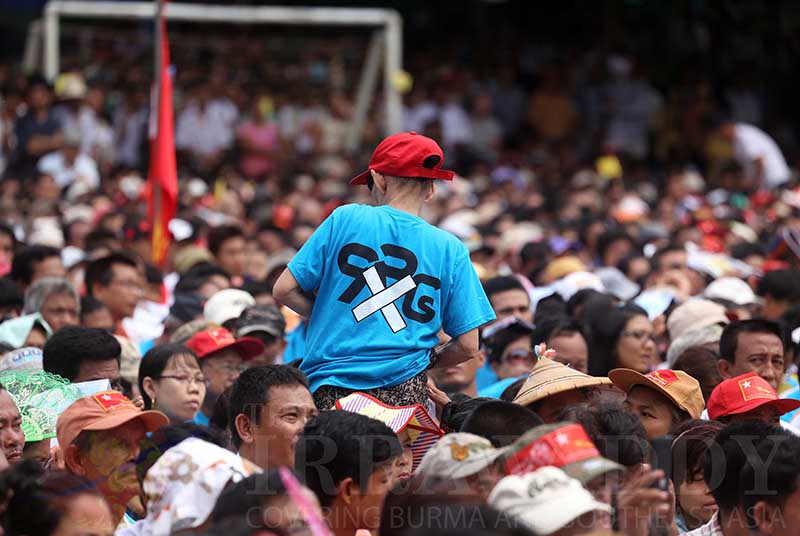 The National League for Democracy (NLD) and its leader Daw Aung San Suu Kyi, have faced intimidation from Burma’s electoral commission in recent weeks as the campaign to amend Burma’s 2008 Constitution continues to draw strong support throughout the country. As the public rallies behind the campaign, Burma’s ruling Union Solidarity and Development Party (USDP) have accused the campaign leaders of sowing public unrest and disorder.
The National League for Democracy (NLD) and its leader Daw Aung San Suu Kyi, have faced intimidation from Burma’s electoral commission in recent weeks as the campaign to amend Burma’s 2008 Constitution continues to draw strong support throughout the country. As the public rallies behind the campaign, Burma’s ruling Union Solidarity and Development Party (USDP) have accused the campaign leaders of sowing public unrest and disorder.
Last month, Daw Aung San Suu Kyi spoke to a crowd of over 20,000 supporters in Mandalay, calling on the military to forgo their fear of constitutional amendment in support of democratic reform. According to a recent statement from Human Rights Watch, the Union Electoral Commission (UEC) subsequently warned the NLD leader that such comments are illegal and unconstitutional, and could jeopardize her party’s re-registration ahead of by-elections in 2014. The NLD has responded to the UEC’s warning as inappropriate, owing to the fact that political parties are allowed to stage rallies so long as they are in accordance with the law.
| |Burma’s Top Priority Must Be Constitutional Reform for All
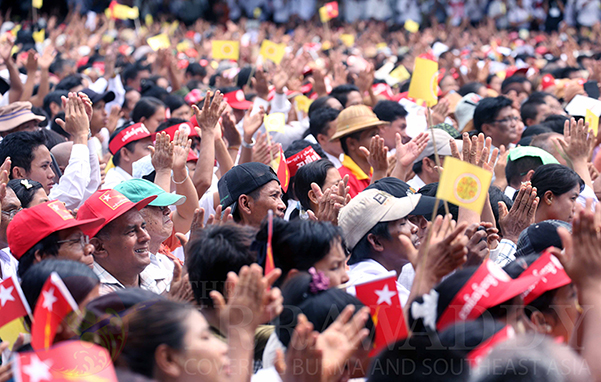 The NLD and 88 Generation Peace and Open Society have been campaigning actively and vociferously for various amendments to the military-drafted 2008 Constitution. Over the weekend, thousands of supporters came out in support of mass rallies for constitutional reform held in Rangoon and Mandalay on Saturday and Sunday, respectively. It is the first time that the two pro-democracy parties have co-hosted an event […]
The NLD and 88 Generation Peace and Open Society have been campaigning actively and vociferously for various amendments to the military-drafted 2008 Constitution. Over the weekend, thousands of supporters came out in support of mass rallies for constitutional reform held in Rangoon and Mandalay on Saturday and Sunday, respectively. It is the first time that the two pro-democracy parties have co-hosted an event […]
United States Commission on International Religious Freedom’s 2014 Annual Report
Political reforms in Burma have not improved legal protections for religious freedom and have done little to curtail anti-Muslim violence, incitement and discrim¬ination, particularly targeting the Rohingya Muslim minority. Police failed to intervene effectively and the government has taken inadequate steps to address the underlying causes of sectarian violence or hold individ¬uals fully accountable. State-sponsored discrimination and state-condoned violence against Rohingya and Kaman ethnic Muslim minorities also continued, and ethnic minority Christians faced serious abuses during recent military incursions in Kachin state. Based on these systematic, egregious, ongoing violations, USCIRF continues to recommend that Burma be designated as a “country of particular concern,” or CPC, in 2014. The State Department has designated Burma a CPC since 1999 […]
| |UNPFA IS LAUCHING 2014 POPULATION AND HOUSING CENSUS ON 1ST MARCH 2014 DESPITE THE WORNG ETHNICITY CODING, WITHOUT INCLUSIVE COMMUNITY CONSULTATION AND APPROVAL
We, the Kachin National Organisation, are extremely concerned that Ms. Janet Jackson, UNFPA Representative is planning to launch controversial ‘2014 Population and Housing Census on 1st March 2014’ despite the incorrect ethnicity coding and without proper inclusive community consultation with ethnic nationalities […]
| |Significant Constitutional Changes are a Must for Genuine Democracy
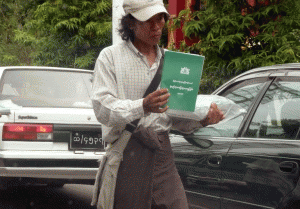 As the timeframe for submission to the parliamentary Joint Committee for Reviewing the Constitution enters its final month, pressure to amend this flawed document is ratcheting up. Opposition parties, ethnic armed groups, democracy activists, members of the public and Daw Aung San Suu Kyi are all voicing how imperative it is for democracy that the constitution is changed.
As the timeframe for submission to the parliamentary Joint Committee for Reviewing the Constitution enters its final month, pressure to amend this flawed document is ratcheting up. Opposition parties, ethnic armed groups, democracy activists, members of the public and Daw Aung San Suu Kyi are all voicing how imperative it is for democracy that the constitution is changed.
The 2008 Constitution, which the military regime introduced after a sham referendum in 2008, entrenches the Burma Army in positions of power, gives the state the ownership of all land in the country, and denies Burma’s ethnic nationalities equality and the right to self-determination. It also fails on grounds of inclusiveness, omitting to protect and respect the human rights of all people in Burma, regardless of race, religion or color. It is undemocratic, illegitimate and a major hurdle for progress in Burma’s reform process […]
Statement from the Kachin Community in Australia
We, the Kachin organisations in Australia, are aware that Daw Aung San Suu Kyi is scheduled to visit Australia this month and meet with Burmese community members and representatives. As we are invited to attend events welcoming her, we as a Kachin community, have collectively decided not to attend any events and public forums related […]
| |
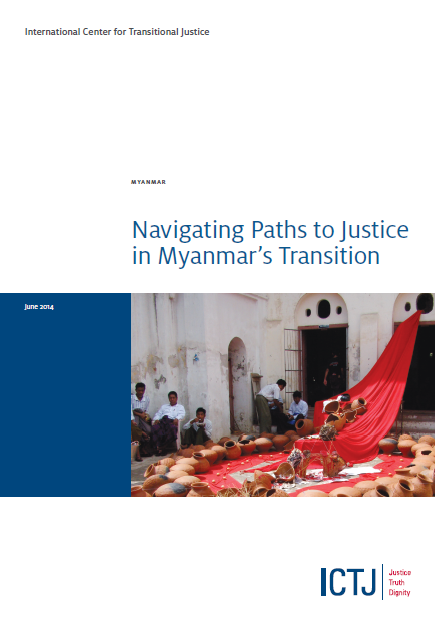








 All posts
All posts